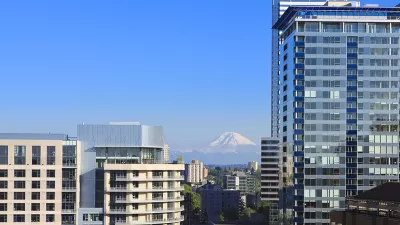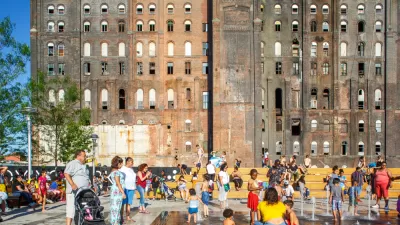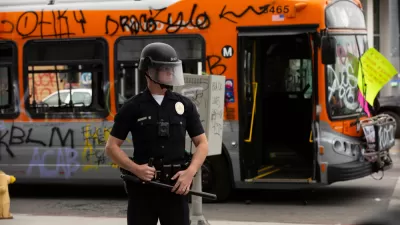Planetizen managing editor Jonathan Nettler recently spoke with Steven Anderson, founder and managing director of InfrastructureUSA, about the country's infrastructure challenges and how local communities are finding creative ways to solve them.
With the United States' overdue infrastructure tab approaching $2.3 trillion, or more, over the next decade to modernize the country's aging transportation, energy, and water infrastructure, Nettler spoke about the reasons he perceives such issues are not getting addressed and fail to get the attention they deserve:
"one challenge is that, with infrastructure, is that itʼs unseen. Itʼs something that, until thereʼs a real crisis...people assume that the people that theyʼve elected and the people theyʼre paying their taxes to are handling these problems. I think the other issue is that, certainly today, itʼs incredibly difficult to marshal the resources to tackle these issues and to get the political will behind spending money."
And on the ways in which localities are working to address their infrastructure challenges:
"what cities across the country are realizing -- you see this in Los Angeles with the "Measure R" funding, which is entirely locally funding for transit improvements; you see this recently in Chicago just last week with Mayor Emmanuelʼs announcement -- is that cities and localities are realizing that to tackle these urgent issues, theyʼre going to have to take matters into their own hands and really move beyond reliance on leadership and funding from the federal level because things just arenʼt getting done and these problems continue to get worse."
FULL STORY: Guest on The Infra Blog: Jonathan Nettler, AICP, Managing Editor, Planetizen

Alabama: Trump Terminates Settlements for Black Communities Harmed By Raw Sewage
Trump deemed the landmark civil rights agreement “illegal DEI and environmental justice policy.”

Planetizen Federal Action Tracker
A weekly monitor of how Trump’s orders and actions are impacting planners and planning in America.

The 120 Year Old Tiny Home Villages That Sheltered San Francisco’s Earthquake Refugees
More than a century ago, San Francisco mobilized to house thousands of residents displaced by the 1906 earthquake. Could their strategy offer a model for the present?

In Both Crashes and Crime, Public Transportation is Far Safer than Driving
Contrary to popular assumptions, public transportation has far lower crash and crime rates than automobile travel. For safer communities, improve and encourage transit travel.

Report: Zoning Reforms Should Complement Nashville’s Ambitious Transit Plan
Without reform, restrictive zoning codes will limit the impact of the city’s planned transit expansion and could exclude some of the residents who depend on transit the most.

Judge Orders Release of Frozen IRA, IIJA Funding
The decision is a victory for environmental groups who charged that freezing funds for critical infrastructure and disaster response programs caused “real and irreparable harm” to communities.
Urban Design for Planners 1: Software Tools
This six-course series explores essential urban design concepts using open source software and equips planners with the tools they need to participate fully in the urban design process.
Planning for Universal Design
Learn the tools for implementing Universal Design in planning regulations.
Clanton & Associates, Inc.
Jessamine County Fiscal Court
Institute for Housing and Urban Development Studies (IHS)
City of Grandview
Harvard GSD Executive Education
Toledo-Lucas County Plan Commissions
Salt Lake City
NYU Wagner Graduate School of Public Service





























